
Jean-Baptiste le Rond d'Alembert was a French mathematician, mechanician, physicist, philosopher, and music theorist. Until 1759 he was, together with Denis Diderot, a co-editor of the Encyclopédie. D'Alembert's formula for obtaining solutions to the wave equation is named after him. The wave equation is sometimes referred to as d'Alembert's equation, and the fundamental theorem of algebra is named after d'Alembert in French.

Encyclopédie, ou dictionnaire raisonné des sciences, des arts et des métiers, better known as Encyclopédie, was a general encyclopedia published in France between 1751 and 1772, with later supplements, revised editions, and translations. It had many writers, known as the Encyclopédistes. It was edited by Denis Diderot and, until 1759, co-edited by Jean le Rond d'Alembert.

Paul-Henri Thiry, Baron d'Holbach, was a French-German philosopher, encyclopedist, writer, and prominent figure in the French Enlightenment. He was born Paul Heinrich Dietrich in Edesheim, near Landau in the Rhenish Palatinate, but lived and worked mainly in Paris, where he kept a salon. He was well known for his atheism and for his voluminous writings against religion, the most famous of them being The System of Nature (1770) and The Universal Morality (1776).
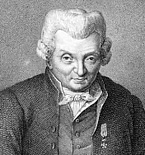
André Morellet was a French economist, author of various writings, contributor to the Encyclopédie and one of the last Enlightenment Age philosophes.

François-Vincent Toussaint was a French writer most famous for Les Mœurs. The book was published in 1748 and banned the same year; it was prosecuted and burned by the French court of justice.

Charles de Brosses, comte de Tournay, baron de Montfalcon, seigneur de Vezins et de Prevessin, was a French writer of the 18th century.

Henri-Louis Duhamel du Monceau, was a French physician, naval engineer and botanist. The standard author abbreviation Duhamel is used to indicate this person as the author when citing a botanical name.

Johann Heinrich Samuel Formey was a German churchman, educator, author, and journalist. The son of an immigrant French family, he preached, taught, and wrote in French. A founding member of the Berlin Academy, he wrote thousands of letters, popularized scientific and philosophical ideas, and also contributed to Diderot's Encyclopédie.

Jean Le Clerc, also Johannes Clericus, was a Genevan theologian and biblical scholar. He was famous for promoting exegesis, or critical interpretation of the Bible, and was a radical of his age. He parted with Calvinism over his interpretations and left Geneva for that reason.
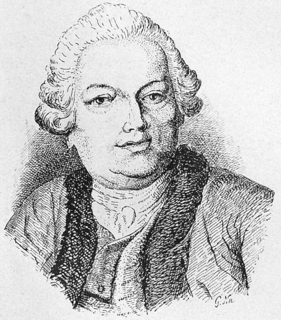
Claude Bourgelat was a French veterinary surgeon. He was a founder of scientifically informed veterinary medicine, and he created one of the earliest schools for training professional veterinarians.

Antoine Augustin Calmet, O.S.B., a French Benedictine monk, was born at Ménil-la-Horgne, then in the Duchy of Bar, part of the Holy Roman Empire.
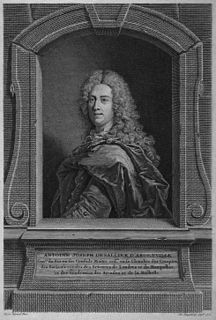
The family of Dezallier d'Argenville produced two writers and connoisseurs, father and son, in the course of the 18th century. The father, Antoine-Joseph Dezallier d'Argenville is now best known for writing the fullest French treatise on the French formal garden style of his lifetime, as well as books on natural history, and as a significant collector of old master prints.

César Chesneau, sieur Dumarsais or Du Marsais was a French philosophe, grammarian and contributor to the Encyclopédie ou Dictionnaire raisonné des sciences, des arts et des métiers.

Claude-Henri Watelet was a rich French fermier-général who was an amateur painter, a well-respected etcher, a writer on the arts and a connoisseur of gardens. Watelet's inherited privilege of farming taxes in the Orléanais left him free to pursue his avocations, art and literature and gardens. His Essai sur les jardins, 1774, firmly founded on English ideas expressed by Thomas Whately, introduced the English landscape garden to France, as the jardin Anglois. The sociable Watelet, who was born and died in Paris, was at the center of the French art world of his time.
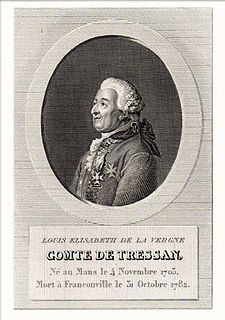
Louis-Élisabeth de la Vergne, comte de Tressan was a French soldier, physician, scientist, medievalist and writer, best known for his adaptations of "romans chevaleresques" of the Middle Ages, which contributed to the rise of the Troubadour style in the French arts.

Pierre-Jean Grosley was a French man of letters, local historian, travel writer and observer of social mores in the Age of Enlightenment and a contributor to the Encyclopédie ou Dictionnaire raisonné des sciences, des arts et des métiers.
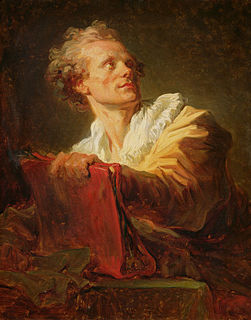
Jacques-André Naigeon was a French artist, atheist–materialist philosopher, editor and man of letters best known for his contributions to the Encyclopédie and for reworking Baron d'Holbach's and Diderot's manuscripts.

In Letter on the Blind for the Use of those who can see, Denis Diderot takes on the question of visual perception, a subject that, at the time, experienced a resurgence of interest due to the success of medical procedures that allowed surgeons to operate on cataracts and certain cases of blindness from birth. Speculations were then numerous upon what the nature and use of vision was, and how much perception, habit, and experience allow individuals to identify forms in space, to perceive distances and to measure volumes, or to distinguish a realistic work of art from reality.
Jacques-François de Villiers (1727–1794) was a French physician and translator.

Charles Palissot de Montenoy was an 18th-century French playwright, admirer and disciple of Voltaire and Antoine de Rivarol. Paradoxically, he was often denounced as a Counter-Enlightenment opponent to the parti philosophique, especially for his critic of Diderot and the Encyclopédistes. He is the author of the comedy, Les Philosophes, which was a huge success and caused a scandal in 1760.



















